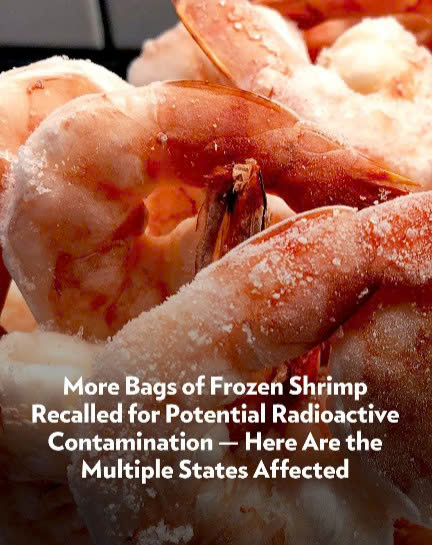The U.S. Food and Drug Administration (FDA) has announced yet another recall involving frozen shrimp products after traces of the radioactive isotope Cesium-137 were detected in certain shipments. Just days after issuing a recall on frozen raw shrimp sold at Walmart under the Great Value brand, the FDA is now cautioning consumers about an expanded recall involving thirteen shrimp products from Southwind Foods of California, distributed under the brand names Sand Bar, Best Yet, Great American, Arctic Shores, and First Street.

According to the recall notice issued on August 21, 2025, these products may have been contaminated with Cesium-137, a radioactive isotope that is classified as a potential health risk if consumed repeatedly over time. The recalled shrimp items, which include both raw and cooked products as well as shrimp salads packaged in multiple sizes, were distributed to retailers, wholesalers, and distributors in nine states: Alabama, Arizona, California, Massachusetts, Minnesota, Pennsylvania, Utah, Virginia, and Washington between July 17 and August 8. The FDA also provided images of the packaging to help consumers identify affected items and urged the public to dispose of them immediately. Cesium-137, often abbreviated as Cs-137, is described by the Environmental Protection Agency as a soft, silvery-white metal that becomes liquid near room temperature.
It occurs as a byproduct of nuclear fission and is one of the most significant isotopes released in nuclear accidents. While small traces are sometimes present in the environment at background levels, higher levels can contaminate water and food products grown or raised in affected areas. The FDA explained that prolonged exposure to low doses of Cs-137, such as consuming contaminated food or water over time, increases the risk of developing cancer due to DNA damage within living cells. The agency confirmed that no illnesses have been reported to date, but investigations remain ongoing.
The contamination was linked to shrimp products supplied by PT. Bahari Makmur Sejati (BMS Foods) of Indonesia, which has been under investigation for unsanitary processing conditions and chemical contamination. As a result, BMS Foods has been placed on an import alert, meaning that its shrimp products are currently barred from entering U.S. commerce. Earlier in the week, on August 19, Walmart recalled three specific lots of its Great Value frozen raw shrimp because of the same concern.
Those shrimp products were distributed across multiple states including Alabama, Arkansas, Florida, Georgia, Kentucky, Louisiana, Missouri, Mississippi, Ohio, Oklahoma, Pennsylvania, Texas, and West Virginia. The recalled lots carried the codes 8005540-1, 8005538-1, and 8005539-1, with a best-by date of March 15, 2027. The FDA stated that those who purchased these products should not consume them and should dispose of them safely. The issue has raised concerns because Cesium-137 has a half-life of about 30 years, meaning it remains hazardous in the environment for decades.
Consumers have been urged to remain cautious and check any shrimp products purchased within the affected time frame. The FDA is continuing its investigation into both the shipping containers and the shrimp products themselves to determine the extent of contamination. For consumers, the situation is particularly troubling given that shrimp is one of the most widely consumed types of seafood in the United States. This recall follows another significant seafood-related recall earlier in the year when nearly 45,000 pounds of shrimp were pulled from the market due to potential listeria contamination, highlighting the growing scrutiny of seafood imports and processing facilities.
Southwind Foods has emphasized that they are working with the FDA to ensure that no further contaminated products remain on the shelves, but the scale of the recall has drawn attention to the vulnerability of the global food supply chain. With much of the seafood consumed in the U.S. being imported, consumers rely heavily on oversight from agencies like the FDA to ensure safety. While no immediate illnesses have been linked to the affected shrimp, the FDA stressed that the long-term risks associated with radioactive exposure cannot be overlooked. Eating contaminated shrimp just once is unlikely to cause immediate harm, but repeated exposure over time could elevate the risk of cancer, making the recall precautionary but essential.
For now, the FDA recommends that anyone who purchased shrimp products from the affected brands or from Walmart in the identified lot numbers throw them away immediately rather than attempting to return or consume them. The agency also encourages consumers to stay alert for further updates as investigations continue and additional recalls may follow. This recall serves as a stark reminder of the complexities and potential hazards of the modern food supply chain, where contamination at one facility can affect products distributed across numerous states and sold under different brand names.
For families who regularly buy frozen shrimp, especially from Walmart or other large retailers, the safest course of action is to check packaging carefully, discard affected items, and monitor official FDA announcements for additional developments. The agency reassured the public that food safety remains a top priority and that strict measures are being taken to prevent future incidents of this nature, but the case of the radioactive shrimp underscores just how vital vigilant oversight is in protecting consumer health.





